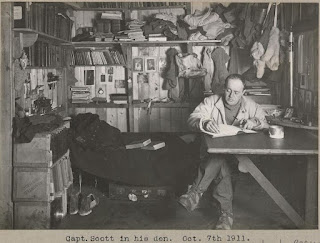It was one hundred and ten years ago today that Norwegian explorer Roald Amundsen became the first man to reach the South Pole, beating Robert F. Scott. Britain’s Robert Falcon Scott and Norway’s Roald Amundsen both launched expeditions to reach the South Pole. Although both men eventually reached the South Pole, the end in victory for Amundsen – and tragedy for Scott.
Robert Falcon Scott had attempted to reach the South Pole once before in 1902 but his party were forced to turn back due to ill health and freezing weather. It was always Scott’s intention to return and, with the support of the British Admiralty and the government, he obtained a grant of 20,000 pounds.
Scott secured the services of men from his original Antarctic voyage and from Ernest Shackleton’s ship Nimrod, which had recently returned from the Antarctic. His crew included naval seamen, scientists and paying members. His ship Terra Nova sailed for Antarctica in June of 1910.
Roald Amundsen was determined to beat the British expedition and be the first to reach the South Pole. He kept his plans to head south very secret - he had originally planned to try and reach the North Pole, but upon hearing that it had been reached he switched to the South Pole.
Amundsen's ship, the Fram, reached the Ross Ice Shelf on 14 January 1911. Amundsen chose to land at the Bay of Whales. Robert F. Scott chose to land at McMurdo Sound. This decision gave the Norwegian team a 60 mile advantage.
On October 18, 1911, after the Antarctic winter, Amundsen's team began its drive toward the Pole. Captain Scott began his trip three weeks later. At around 3pm on 14 December 1911, Amundsen arrived at the South Pole where he raised the Norwegian Flag. He had reached the Pole 33 days before Captain Scott arrived. Amundsen and his crew returned to their base camp on 25 January 1912, 99 days and roughly 1400 nautical miles after their departure.
 |
| Amundsen at the South Pole |
Scott left his base camp with his team on his trip to the Pole on November 1, 1911. He reached the South Pole on January 17, 1912, where he learned that Amundsen had beaten him to it. The tragic return journey seemed doomed from the start. Weak from exhaustion, hunger, and extreme cold, his last diary entry is dated March 29, 1912. He died in his tent alongside two of his men.
 |
| The last words in Scott's journal |
Amundsen’s success was celebrated worldwide. Scott was also recognized for his achievements. Their stories, told together, remind us of the Wide World of Sports and their slogan...the thrill of victory...and the agony of defeat.

Amundsen succeeded because he used sled dogs.
ReplyDeleteAnd ate them is what I have always heard.
DeleteWhew that was close! Until I read this post, I almost pulled a Rob't Scott as I was planning to go outdoors before dawn on such a horribly cold day with strong winds from the southeast of 27 KM and current temperatures at a bone-chilling -1.1 Celsius. This post quite possibly saved my life. Thank you so much for writing it!
ReplyDeleteAnd this was why the wife thought I was completely nuts when I got out from under the buffalo robe of our warm cozy bed, the raging south wind reverberating through our cheap vinyl windows and coating us in a veil of snow; now she'd have to shovel her own way out of the bedroom after I've gone.
Oh yeah, there's hell to pay now, but at least I'm not writing my last blog post in a deer stand somewhere here, crouched on a repurposed bamboo bar stool in a corner and against the wall huddled in a heavy wool army blanket, the last of my propane for my heater spent; the closed windows all fogged up; my pen tip frozen. No, without your divine intervention I'd be just yet another frozen deer stand occupant someone finds in the spring, stiff as a stick of lutefisk in a herring barrel, no lye.
That was punderful!
DeleteAmundson ended tragically too. In 1928 on a mission to rescue an explorer in the Arctic, his plane disappeared. His body has never been found.
ReplyDeleteOn a happier note, a member of Scott’s base support team, an Irishman named Tom Crean, returned home and opened a pub. The pub has survived.
Have you been there?
Delete